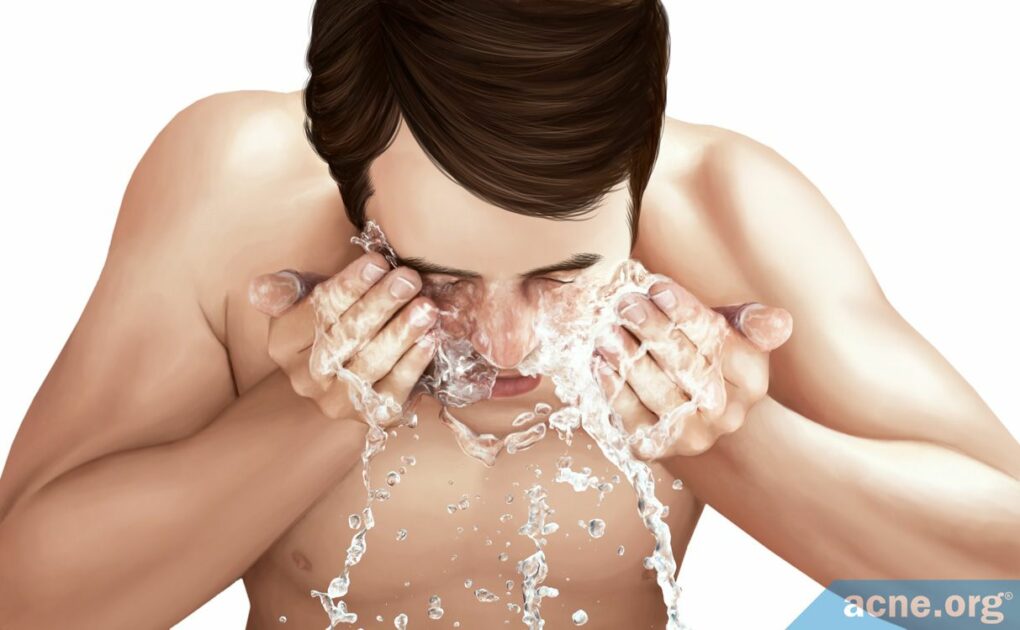Washing Gently, Twice a Day, with a Gentle Facial Cleanser Might Help to Some Degree

The Essential Info
When you have acne, one of the most frustrating things people can tell you is “wash your face.” Yeah…like I hadn’t thought of that.
The truth is washing your face will not do much to clear acne. Acne is caused by a variety of factors, including chronic inflammation and excess skin oil production, all of which are happening inside the skin, not on top of it.
However, available research does point toward a small reduction in acne in people who wash their skin. Exactly why washing would help reduce acne remains a mystery, but suffice it to say that if you have acne, washing your skin won’t hurt, and just might help a bit.
The most important reason to wash your skin when you have acne is to prep the skin for treatment. Cleansing the skin removes dirt, oil, and sweat, which allows acne treatments to best penetrate into the skin.
Choosing a Cleanser: Look for cleansers specifically made to wash the face. Look for the words “gentle” and/or “for sensitive skin” on the label. Avoid soap.
How to Wash: Wash exceedingly gently, for 10 seconds or less. The ingredients in almost any skin cleanser are powerful and do not need much time to do their job. The less time you wash and the gentler you are when you wash, the less irritation you will cause, and the better you will be able to stay clear.
How Often: From the research we have thus far, washing twice a day is ideal. No more, no less.

The Science
Acne is a complex disease that is caused by a variety of factors, including hormones, chronic inflammation, excess skin oil production, overgrowth of skin cells, and bacteria growth. Washing the skin is unlikely to clear acne on its own, but research shows that as long as you wash gently with a non-irritating cleanser, it may help.
Avoid Irritation to Avoid Acne
It is well understood that irritation of the skin can lead to more acne. When it comes to washing the skin, irritation occurs when the outermost layer of the skin surface is damaged. This outermost layer is composed of tightly packed skin cells that are held together with lipids (fats). Skin irritation results when these lipids are disturbed, so it is important to choose a mild skin cleanser that will not strip away essential lipids.1
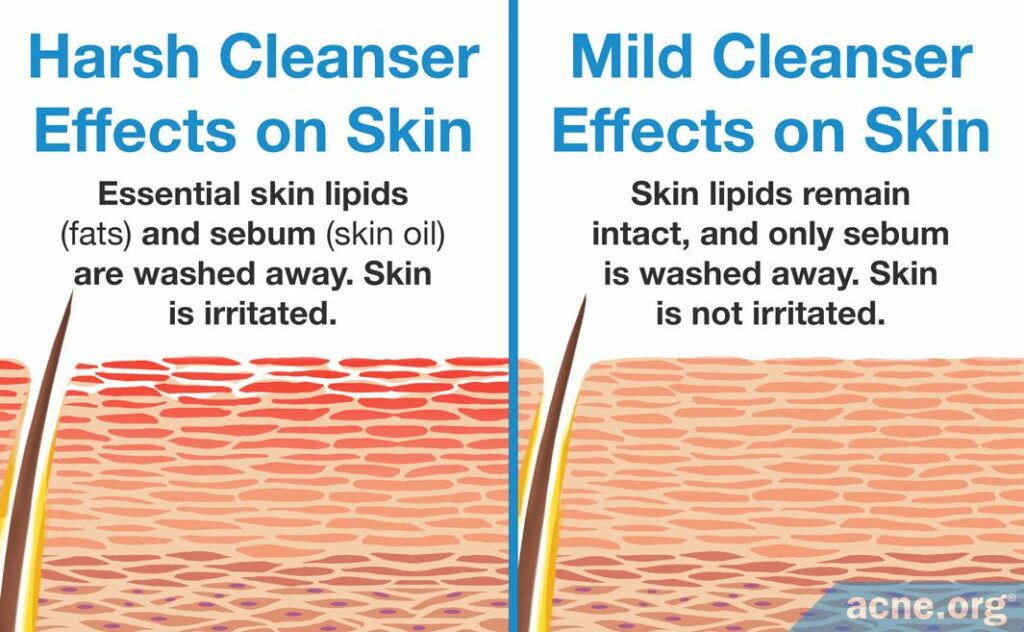
Scientists have performed several studies to identify what properties or ingredients cleansers must possess so that they do not irritate the skin. They found that the best cleansers for acne-prone skin are those that:
- Do not damage the lipids found in the skin
- Keep the skin hydrated
- Maintain the skin’s natural acidity
They also found, in general, that cleansing the skin with a gentle cleanser may be beneficial for acne.
However, while cleansing gently with a non-irritating cleanser may help reduce acne, the researchers also found that washing with soap or harsh cleansers can cause skin irritation and an increase in acne.
Expand to read details of studies

A 2004 review article published in the journal, Dermatologic Therapy, stated that the presence of harsh surfactants in skin cleansers was harmful to the skin. Surfactants are active substances found in detergents and easily can remove dirt and oil from the skin. However, common surfactants such as sodium lauryl sulfate cause “significant skin irritation.” When used on the skin, some surfactants cause skin tightness, dryness, irritation, dehydration, and itching. Therefore, skin cleansers with harsh surfactants should be avoided, as they damage and dehydrate the skin. To decrease the harmful effects of surfactants, researchers created mild surfactants that are less irritating because of their decreased ability to interact with skin cells. Generally, these milder cleansers are sold in liquid form, are extremely gentle on the skin, and are safer to use on acne-prone skin.2

The same 2004 review article also commented on how the acidity of the cleanser affected the skin. The scientific way to measure the acidity of a substance is the pH scale. The pH scale ranges from 1 – 14, 1 representing an extremely acidic substance, 7 representing a neutral substance, and 14 representing an extremely basic substance. For example, the pH of stomach acid is 2, water 7, and baking soda 12. The skin maintains a slightly acidic pH of 5.5. Researchers have found that basic skin cleansers with a pH of 10 cause skin irritation, inflammation, and disrupt the oils found in skin cells. However, skin cleansers with a pH closer to the skin’s normal pH are less damaging to the skin.
Skin cleansers are not the only products whose slight acidity is ideal for acne-prone skin. This applies to moisturizers as well, and such moisturizers also may be beneficial for acne-prone skin since they help to restore and repair skin cell oils that were damaged or lost during cleansing.2

A 1995 study published in the journal, Infection, investigated whether a slightly basic bar soap or a slightly acidic syndet bar was better for acne. Syndet bars are composed of laboratory-synthesized, mild surfactants that retain a slightly acidic pH. To perform this study, the researchers had 120 adolescents and young adults apply either bar to the skin for one minute, twice a day, for three months. Then they compared the severity of acne lesions on the face of the participants between the two groups. They found that those who had used the soap increased the average number of acne lesions from 14.6 to 15.3, while the participants who had used the syndet bar decreased the average number from 13.4 to 10.4. Further, 40% of those who used the bar soap reported skin irritation, and only 1.8% of the syndet bar participants reported skin irritation. The researchers concluded that the “acidic cleanser should be preferred for skin care in adolescents and young adults.”3

A 2015 study published in the journal, Skin Research and Technology, investigated the ability of a specifically designed mild skin cleanser to improve acne. The researchers rated 18 male adults on a scale of 1 – 5 in terms of acne severity, 1 representing no acne and 5 representing severe acne. Skin dryness also was measured using the same scale. Then the participants washed their faces with the newly formulated, mild cleansers twice a day for four weeks. At the beginning of the study, 7 subjects had modest (1 – 1.5 on the 1 – 5 scale) acne; 9 had mild acne (1.5 – 2), and 2 had moderate acne (2 – 3). After four weeks of twice-a-day cleansing, 5 participants had no acne; 2 had mild acne, and 11 had modest acne. The researchers concluded that “[a] significant decrease in acne lesions was observed on every area of the face.”4 However, it is important to keep in mind that this study was performed by the company that made the skin cleanser, and they used company employees as participants. More independent research is needed in order to confirm these findings.
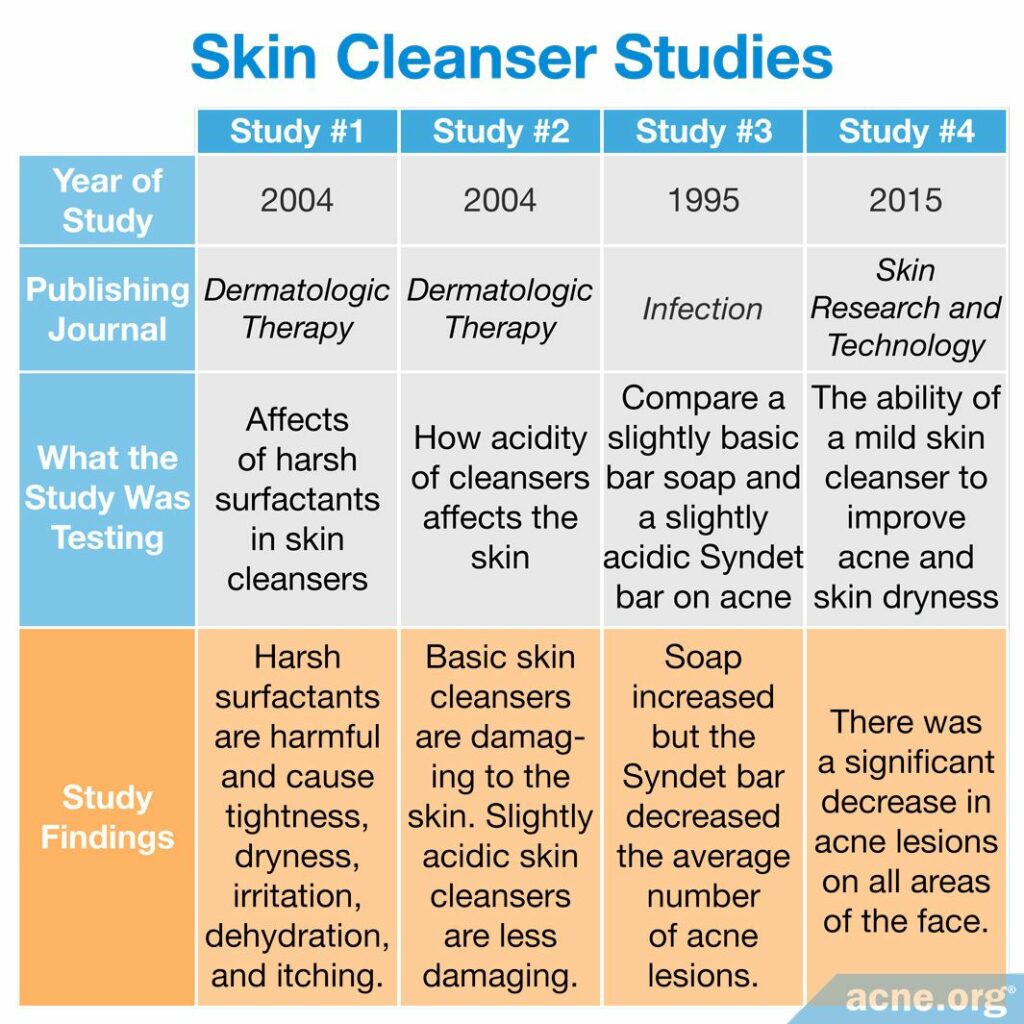
Choosing a Safe Cleanser
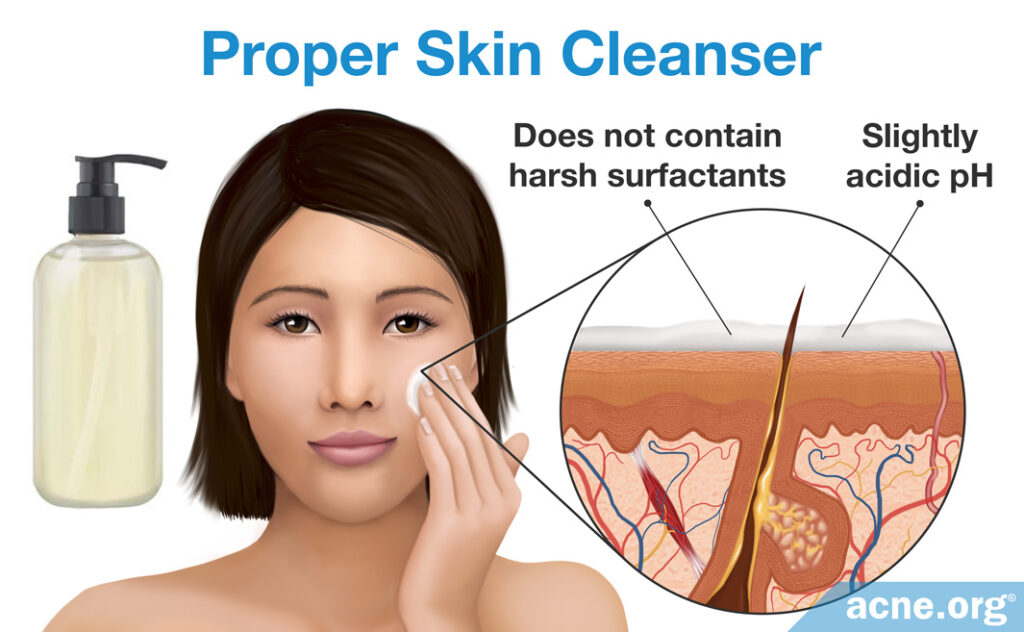
Cleansers contain ingredients called surfactants that remove dirt, oil, and sweat. Some surfactants are gentle, and others are harsh.
The gentlest surfactants match the skin’s natural acidity, whereas the harshest surfactants, such as soap, are alkaline, and thus force the skin out of balance.
It may seem overwhelming to find a cleanser that has only gentle surfactants and is slightly acidic, but following these simple steps will allow you to find the right product:
- Make sure the cleanser is specifically made for the face
- Look for the words “gentle,” “ultra-gentle,” and/or “for sensitive skin”
- Choose a liquid cleanser over a bar
- Avoid soap
How to Wash
As we have seen, properly washing your face with a gentle cleanser may help keep acne in check to some degree. In addition to this, it will also help topical acne treatments to penetrate the skin better.7,8 But how often should you wash, and how gentle should you stay when washing?
How often
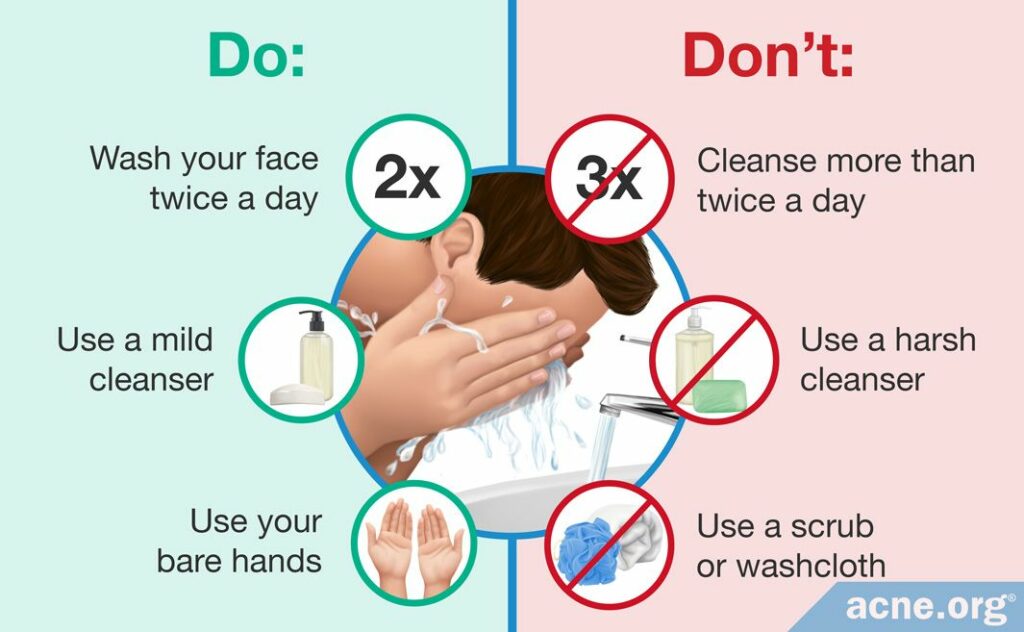
The frequency of skin cleansing is also an important consideration because we know that over-washing the skin can lead to more acne. In fact, acne caused by overwashing the skin actually has its own name: detergent acne.
We only have one study so far that looks at frequency of washing and its effect on acne, and the study is small and performed only on men, but the results show us that twice-daily washing may be best. No more and no less.
Expand to read details of study

A 2006 study published in the journal Pediatric Dermatology investigated whether the frequency of washing the skin improved acne or not. The researchers performed this study on 24 male patients with an average age of 19 years. For the first two weeks of the study, all participants washed their face with the same mild cleanser twice a day. After this two-week period, the subjects were divided into three groups, in which some washed their face once a day, others twice a day, and the rest four times a day. After each week, the researchers counted the number of acne lesions that were present on each participant. After the original two-week period, in which all the men had used the same cleanser, the researchers found that the mild cleanser decreased the number of whiteheads but increased the number of inflammatory acne lesions. After eight weeks, the men in all three groups noticed a decrease in acne lesions, but there were slight differences among men in each group. Specifically, men who had washed their face just once a day experienced slightly more acne than those who had washed their face two or four times a day. The scientists observed no differences in the acne of the men who had washed their face two or four times a day. The researchers preferred twice-a-day washing in men who had acne.5 This research agrees with other studies which found that increased water contact can excessively dry the skin. The form of this that swimmers sometimes experience is called swimmer’s xerosis.6 The twice-a-day washing schedule that this study found beneficial should ensure that over-washing the skin does not occur.
Stay gentle
It is also important to remain gentle when you wash because we also know that physically irritating the skin can lead to more acne. Acne caused by physical irritation also has its own name: acne mechanica.
To stay as gentle as possible, use only your bare hands, employ a featherlight touch, and try to keep the time down to 10 seconds or less.
References
- Solomon, B. A. & Shalita, A. R. Effects of Detergents on Acne. Clin Dermatol 14, 95 – 99 (1996). https://www.ncbi.nlm.nih.gov/pubmed/8901406
- Ananthapadmanabhan, K. P., Moore, D. J., Subramayan, K., Misra, M. & Meyer, F. Cleansing without compromise: the impact of cleansers on the skin barrier and the technology of mild cleansing. Dermatol Ther 17, 16 – 25 (2004). https://www.ncbi.nlm.nih.gov/pubmed/14728695
- Korting, H. C. et al. The influence of the regular use of soap or acidic syndet bar on pre-acne. Infection 23, 89 – 93 (1995). https://www.ncbi.nlm.nih.gov/pubmed/7622270
- Isoda, K. et al. Effects of washing of the face with a mild facial cleanser formulated with sodium laureth carboxylate and alkyl carboxylates on acne in Japanese adult males. Skin Res Tech 21, 247 – 253 (2015). https://www.ncbi.nlm.nih.gov/pubmed/25115352
- Choi, J. M., Lew, V. K. & Kimball, A. B. A Single-blinded, Randomized, Controlled Clinical Trial Evaluating the Effect of Face Washing on Acne Vulgaris. Ped Dermatol 23, 421 – 427 (2006). https://www.ncbi.nlm.nih.gov/pubmed/17014635
- Blattner, C. M., Kazlouskaya, V., Coman, G. C., Blickenstaff, N. R., Murase, J. E. Dermatological conditions of aquatic athletes, World J Dermatol 4, 8 – 15 (2015). https://www.wjgnet.com/2218-6190/full/v4/i1/WJD-4-8-g008.htm
- Del Rosso, J. Q. The role of skin care as an integral component in the management of acne vulgaris: Part 1: The importance of cleanser and moisturizer ingredients, design, and product selection. J Clin Aesthet Dermatol 6, 19-27 (2013). https://www.ncbi.nlm.nih.gov/pubmed/24765221
- de Lucas, R., Moreno-Arias, G., Perez-López, M., Vera-Casaño, Á., Aladren, S. & Milani, M6. ACTUO Investigators study group. Adherence to drug treatments and adjuvant barrier repair therapies are key factors for clinical improvement in mild to moderate acne: the ACTUO observational prospective multicenter cohort trial in 643 patients. BMC Dermatol 11, 15:17 (2015). https://www.ncbi.nlm.nih.gov/pubmed/26361978
 Acne.org Products
Acne.org Products